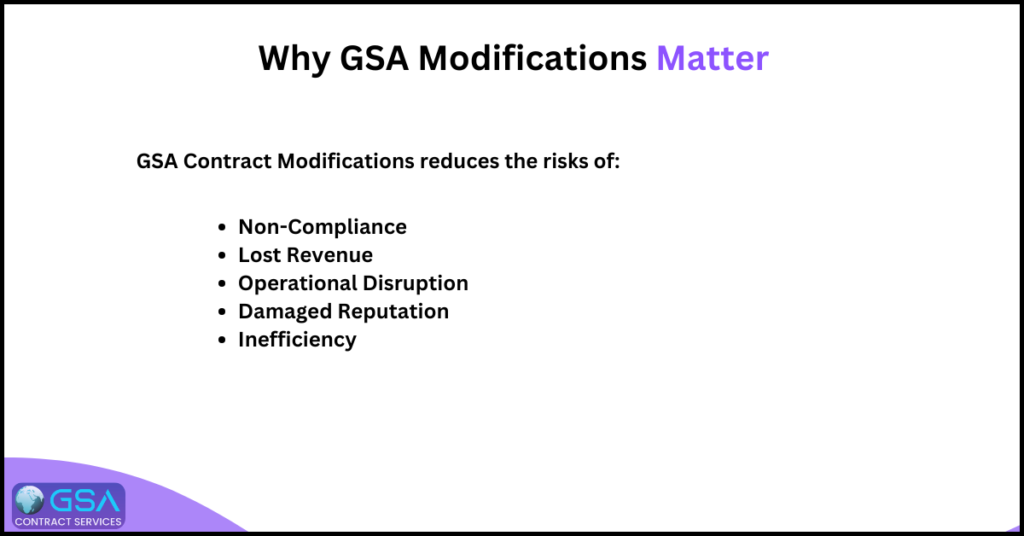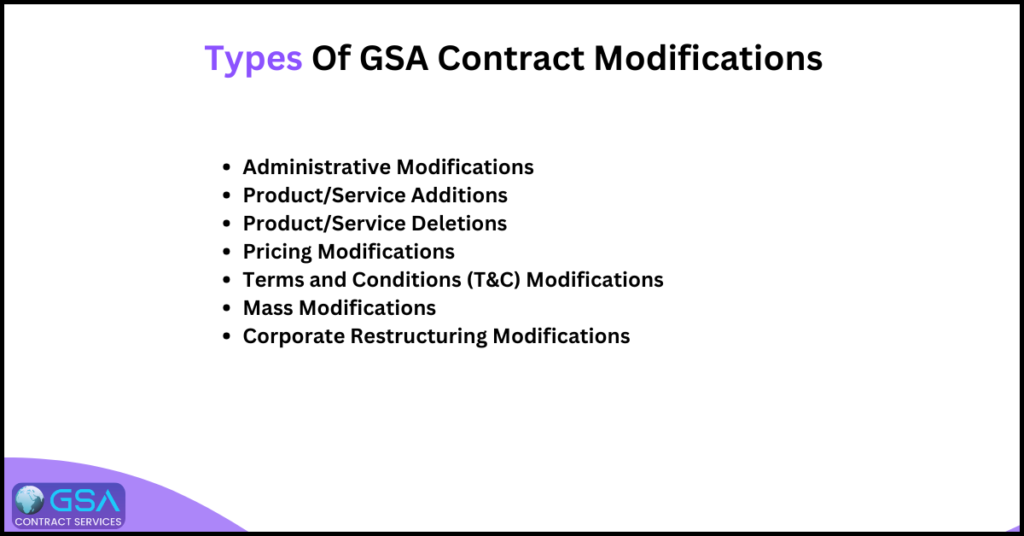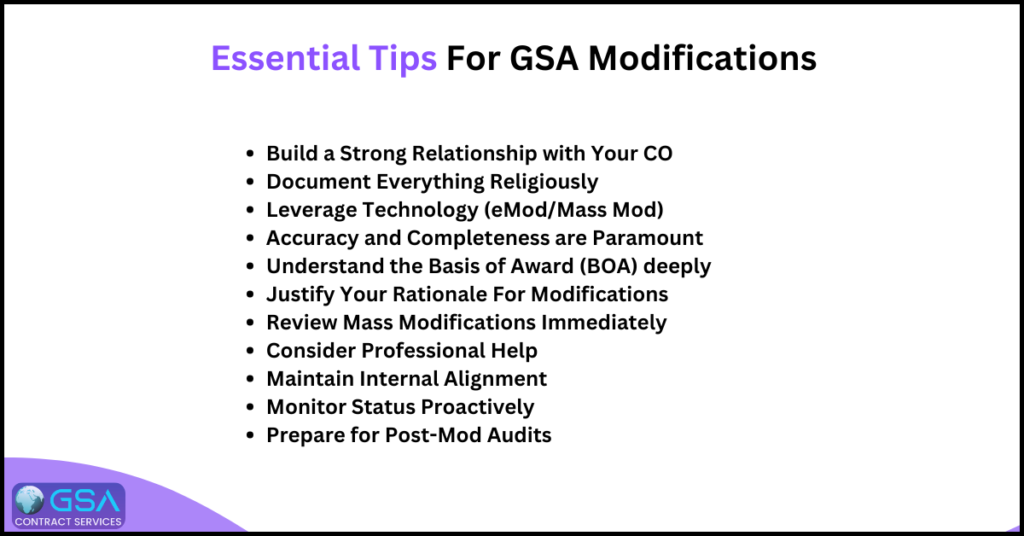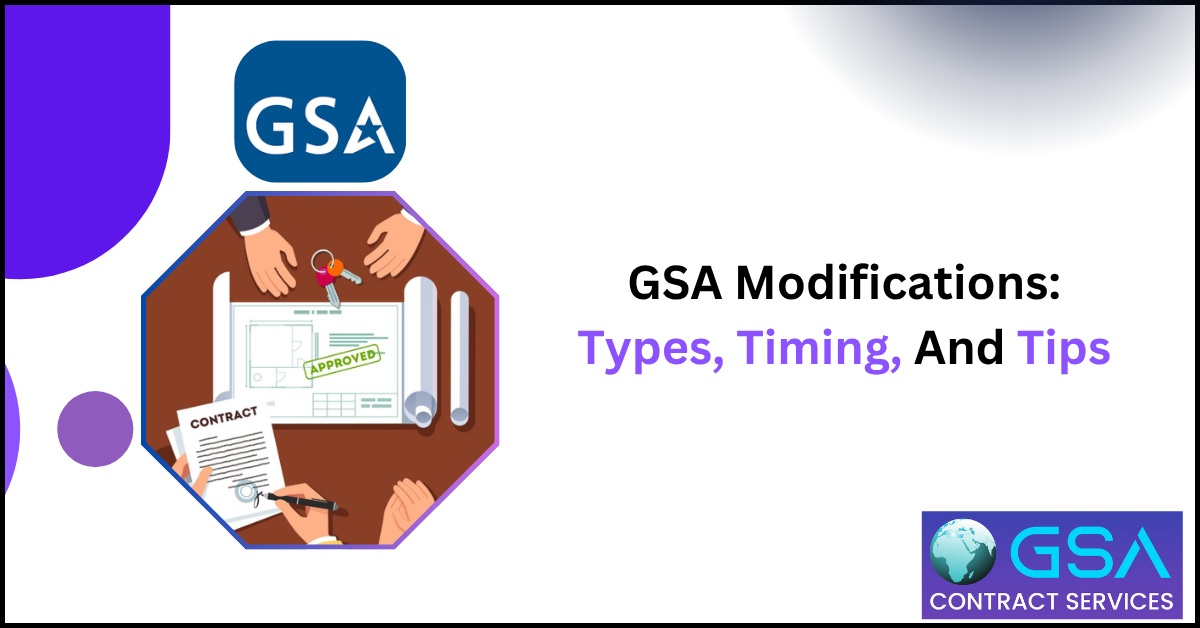Securing a coveted General Services Administration (GSA) Schedule contract is a significant achievement, opening the door to billions in potential federal sales. However, the journey doesn’t end with an award. The dynamic nature of business – evolving products, shifting market conditions, new opportunities, and internal changes – necessitates updates to your contract.
This is where GSA Schedule Modifications become critical. Far from mere paperwork, modifications are the lifeblood that keeps your contract relevant, compliant, and competitive. Understanding the types, mastering the timing, and implementing strategic tips are essential for maximizing the value of your Schedule and avoiding costly pitfalls.
Why Modifications Matter: Beyond Compliance
Failing to keep your GSA Schedule contract current isn’t just an administrative oversight; it carries substantial risks:
Non-Compliance: Selling items or services not listed, at outdated prices, or through unauthorized channels violates the terms of your contract. This can trigger audits, financial penalties (price reductions, refunds), contract termination, suspension, or even debarment.
Lost Revenue: Inability to add new, high-demand products/services means missing out on significant sales opportunities. Outdated pricing can make you uncompetitive.
Operational Disruption: Selling non-contract items forces complex off-schedule procedures or risks non-compliance. Inaccurate terms hinder efficient ordering.
Damaged Reputation: Non-compliance erodes trust with both GSA and potential government customers, impacting future business prospects.
Inefficiency: Manually managing off-schedule sales is more cumbersome than leveraging the streamlined Schedule process.

Proactive modification management is not just about avoiding trouble; it’s about strategically leveraging your Schedule for sustained growth and success.
The Modification Landscape: Understanding The Types
GSA modifications fall into several distinct categories, each serving a specific purpose and following its own process. Knowing which type applies is the first step:
Administrative Modifications
These are typically non-substantive changes that don’t alter the scope, terms, or pricing of the contract. They are usually processed quickly.
Examples: Updating points of contact (POC), phone numbers, email addresses, DUNS number, CAGE code (if no entity changes), payment address, administrative office location (not place of performance), and correcting minor clerical errors in the contract documents.
Process: Generally submitted via email or the Contract Modification (Mod) system in the Mass Mod platform or eMod (depending on Schedule/SIN), often requiring minimal documentation (e.g., a letter request).
Product/Service Additions
Adding new items (products, services, or SINs) to your existing Schedule contract.
Scope: Must fall within the scope of your awarded Schedule and SIN(s). Adding a completely new SIN often requires justification and may be treated more rigorously than adding items under an existing SIN.
Requirements: Detailed product/service descriptions, manufacturer information (if applicable), commercial sales practices (CSP) disclosure demonstrating the new item meets the Basis of Award (BOA) customer criteria, proposed GSA pricing supported by your Commercial Price List (CPL) and discounting practices, and often a new price list. Technical specifications, brochures, and safety certifications may be required.
Process: Submitted formally through the Modification system (eMod/Mass Mod). Requires significant documentation and negotiation similar to the initial offer, though potentially streamlined for items very similar to existing offerings.
Product/Service Deletions
Removing items or entire SINs from your contract.
Reasons: Items are discontinued by the manufacturer, there is a lack of sales, a shifting business focus, or they are replaced by newer models.
Process: Usually straightforward via Mod request. Specify the items/SINs to be deleted and the effective date. Consider the impact on existing orders (the contractor is typically obligated to fulfill existing orders placed before the deletion effective date). Deleting your only item under a SIN effectively removes that SIN.
Pricing Modifications
Changing the prices (either increases or decreases) of items already on contract.
Price Increases: Require robust justification. Common triggers include:
Commercial Price Increases: Supported by a current, updated CPL showing the increase for the BOA customer(s).
Product Changes: Significant enhancements (must be documented) may warrant a price increase.
Required by Law: E.g., minimum wage increases impacting service labor categories.
Economic Price Adjustments (EPAs): If your contract includes specific, pre-negotiated EPA clauses tied to indexes (like CPI) or material costs, increases following those clauses are permitted.
Price Decreases: Often driven by market competition, volume discounts achieved, or proactive positioning. While easier to justify, they still require formal modification to update the contract and pricelist.
Crucially: You must offer the government your new lower price immediately upon lowering it for your BOA customer(s) – you cannot wait for the modification approval. Document this carefully.
Process: Requires a Mod request with detailed justification (especially for increases), updated CSP disclosures showing impact on the BOA, and a revised pricelist. Negotiation is common, particularly for increases.
Terms and Conditions (T&C) Modifications
Updating the legal and procedural framework of the contract.
Scope: Changes to delivery terms, warranty terms, ordering procedures, option periods, or incorporating new GSA-wide clauses mandated via Mass Modification (Mass Mod).
Mass Modifications:
GSA frequently issues mandatory changes to standard contract terms for all contractors on a Schedule or across multiple Schedules. Accepting these Mass Mods is usually required to keep your contract active and compliant. Failure to accept within the specified timeframe can lead to cancellation.
Process: Contractor-specific T&C changes require negotiation and a formal modification. Mass Mods are typically accepted electronically via the Mass Mod system with a few clicks, though review is essential.
Corporate Restructuring Modifications
Required for significant changes to the legal entity holding the contract.
Examples: Mergers, acquisitions, spin-offs, novations (transferring the contract to a different legal entity), changes in company name without a structural change.
Process: Novations are complex. They require extensive documentation proving the new entity assumes all obligations, proof of asset transfer, and approval from both GSA and potentially other agencies.
Name changes require legal documentation (e.g., Secretary of State filings). Early communication with your Contracting Officer (CO) is vital.

The Critical Element: Mastering Modification Timing
Timing is arguably the most challenging and crucial aspect of modification management. GSA’s review process is often lengthy, and government fiscal cycles add another layer of complexity.
Proactive, Not Reactive:
Plan Ahead: Integrate modification planning into your business processes. When you know a new product launch is coming, a price increase is inevitable, or a corporate change is on the horizon, start the modification process early.
Anticipate Delays: Assume the review will take longer than expected. GSA COs manage large portfolios; complex mods can take 3-9 months or more. Build this buffer into your business plans.
Key Timing Triggers:
Commercial Changes: The instant your commercial pricing or product lineup changes for your BOA customer(s), your GSA contract must be updated to reflect this. For price decreases, you must offer the lower price immediately and then submit the mod. For price increases, you cannot charge the higher GSA price until the modification is approved.
New Offerings: Start the addition process well before you want to actively market and sell the item to the government.
Corporate Changes: Initiate novation or name change processes as soon as the corporate decision is final. Delays can create legal and invoicing nightmares.
Mass Modifications: Pay close attention to acceptance deadlines (often 30-90 days from issuance). Missing these can be catastrophic.
Option Periods: Be aware of renewal dates and any requirements well in advance. Ensure your contract is fully compliant to facilitate smooth renewal.
The Price Increase Conundrum:
You CANNOT bill the higher price until GSA approves the mod. This is a fundamental rule. Selling at an unapproved higher price is non-compliant.
Plan Commercial Increases Strategically: If possible, time your commercial price increases to allow maximum lead time for the GSA mod approval before you need to implement the higher government price. Factor in the approval lag when calculating profitability.
Fiscal Year End (Typically Sept 30th):
Avoid: Submitting complex mods (especially price increases or large additions) very close to FY end. Agencies are focused on spending their budgets, and COs are inundated. Processing slows significantly.
Target: Aim to have critical mods submitted and ideally approved well before the summer months preceding FY end.
Essential Tips For Streamlined Success And Avoiding Pitfalls

Navigating modifications effectively requires strategy and diligence:
Build a Strong Relationship with Your CO: They are your primary point of contact. Communicate proactively, clearly, and professionally. Understand their preferences and workload. A good relationship can facilitate smoother communication during mod reviews.
Document Everything Religiously: Maintain meticulous records of all commercial sales, pricing decisions, discount structures, and communications related to your BOA customer(s).
Keep thorough modification submission packages, including all supporting documents and correspondence with GSA.
Document the date you implemented a commercial price decrease and offered it to the government pending mod approval.
Leverage Technology (eMod/Mass Mod): Become proficient in GSA’s electronic modification systems (eMod for most Schedules, Mass Mod portal for accepting mass updates). Ensure your company’s roles and permissions are correctly set up. These platforms streamline submission and tracking.
Accuracy and Completeness are Paramount: Incomplete submissions or packages riddled with errors are the fastest route to delays and rejection. Double-check all data, ensure forms are signed correctly, and include all required supporting documentation before submitting. Follow the GSA checklist meticulously.
Understand the Basis of Award (BOA) deeply: Your BOA customer(s) and the discounts/practices applied to them are the bedrock of your pricing compliance. Any modification, especially pricing or additions, must be analyzed against the BOA. Ensure your CSP disclosures accurately reflect current practices.
Justify, Justify, Justify: Never assume the CO understands your rationale. For price increases, product changes, or adding new SINs, provide clear, detailed, and compelling justifications backed by commercial data. Explain the “why” thoroughly.
Review Mass Modifications Immediately: Don’t let them languish in your inbox. Read them carefully to understand the implications. Accept mandatory Mass Mods before the deadline. Consult experts if the language is unclear.
Consider Professional Help: Especially for complex modifications (novations, major restructures, challenging price justifications, new SIN additions), partnering with experienced GSA consultants or legal counsel familiar with federal procurement can be invaluable. Their expertise can prevent costly mistakes and expedite approval.
Maintain Internal Alignment: Ensure your sales, product, legal, and contracts teams are coordinated. Salespeople need to understand they cannot sell unapproved items or use approved higher prices. Product teams need to flag upcoming changes early.
Monitor Status Proactively: Use the modification tracking features in eMod/Mass Mod. Don’t hesitate to follow up politely with your CO if a mod seems stalled beyond a reasonable timeframe (e.g., 60-90 days with no communication), but respect their workload.
Prepare for Post-Mod Audits: GSA’s OIG or the Contract Audit Agency (DCAA) may review modifications, particularly large price increases or complex corporate changes. Ensure your documentation fully supports the modification request and its implementation.
Conclusion: Modifications as a Strategic Imperative
Viewing GSA Schedule modifications solely as a compliance burden is a missed opportunity. Effectively managing modifications is a core business process and a strategic lever for government contractors.
By thoroughly understanding the different modification types, respecting the critical importance of timing (especially the rule against billing unapproved higher prices), and implementing proactive, disciplined practices, contractors can:
Ensure Continuous Compliance: Minimizing audit risk and protecting the valuable asset that is the Schedule contract.
- Maintain Competitiveness: Keeping offerings and pricing current and attractive to government buyers.
- Capture New Revenue: Quickly adding high-demand products and services to the contract.
- Enhance Operational Efficiency: Leveraging the streamlined Schedule process for all relevant sales.
- Build Stronger Relationships: Fostering trust with both GSA and government customers through reliability and transparency.
Navigating the modification maze requires effort, but the payoff – a dynamic, compliant, and profitable GSA Schedule contract – is well worth the investment. Make modification management a priority, not an afterthought, and unlock the full potential of your federal market access.




